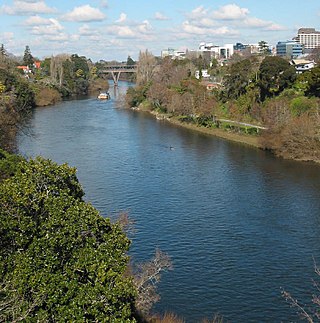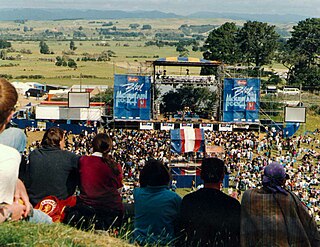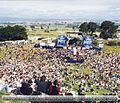
The Waikato River is the longest river in New Zealand, running for 425 kilometres (264 mi) through the North Island. It rises on the eastern slopes of Mount Ruapehu, joining the Tongariro River system and flowing through Lake Taupō, New Zealand's largest lake. It then drains Taupō at the lake's northeastern edge, creates the Huka Falls, and flows northwest through the Waikato Plains. It empties into the Tasman Sea south of Auckland, at Port Waikato. It gives its name to the Waikato region that surrounds the Waikato Plains. The present course of the river was largely formed about 17,000 years ago. Contributing factors were climate warming, forest being reestablished in the river headwaters and the deepening, rather than widening, of the existing river channel. The channel was gradually eroded as far up river as Piarere, leaving the old Hinuera channel through the Hinuera Gap high and dry. The remains of the old course are seen clearly at Hinuera, where the cliffs mark the ancient river edges. The Waikato's main tributary is the Waipā River, which converges with it at Ngāruawāhia.

Parihaka is a community in the Taranaki region of New Zealand, located between Mount Taranaki and the Tasman Sea. In the 1870s and 1880s the settlement, then reputed to be the largest Māori village in New Zealand, became the centre of a major campaign of non-violent resistance to European occupation of confiscated land in the area. Armed soldiers were sent in and arrested the peaceful resistance leaders and many of the Maori residents, often holding them in jail for months without trials.
Postcodes in New Zealand consist of four digits, the first two of which specify the area, the third the type of delivery, and the last the specific lobby, RD number, or suburb. The present postcode system was introduced in New Zealand in June 2006, which, unlike the previous system, applies to all items of mail with effect from June 2008. In October 2008, New Zealand Post launched a 'remember your postcode' campaign, offering a $10,000 prize for remembering a postcode.
The Plague was a New Zealand theatrical punk/art rock band that was active from 1977 to 1979, and was led by Richard von Sturmer. Their most famous performance was at the Nambassa Music Festival in 1979 and they recorded four tracks for the Infectious EP. Von Sturmer went on to a career in writing and film-making and other members went on to play in bands such as The Whizz Kids, Blam Blam Blam, The Swingers, Coconut Rough and Pop Mechanix.
Rock music in New Zealand, also known as Kiwi rock music and New Zealand rock music, rose to prominence first in 1955 with Johnny Cooper's cover version of Bill Haley's hit song "Rock Around the Clock". This was followed by Johnny Devlin, sometimes nicknamed New Zealand's Elvis Presley, and his cover of "Lawdy Miss Clawdy". The 1960s saw Max Merritt and the Meteors and Ray Columbus & the Invaders achieve success. In the 1970s and early 1980s the innovative Split Enz had success internationally as well as nationally, with member Neil Finn later continuing with Crowded House. Other influential bands in the 1970s were Th' Dudes, Dragon and Hello Sailor. The early 1980s saw the development of the indie rock "Dunedin sound", typified by Dunedin bands such as The Clean, Straitjacket Fits and The Chills, recorded by the Flying Nun record label of Christchurch. New Zealand's foremost hard rock band Shihad started their long career in 1988. Since 2018 this title is now undoubtedly held by New Zealand Māori metal band Alien Weaponry who have achieved huge success in Europe and the USA.
The following lists events that happened during 1978 in New Zealand.
The following lists events that happened during 1981 in New Zealand.

Sweetwaters Music Festival was a series of events held between 1980 and 1999, at venues such as a farm in Ngāruawāhia, then further north on a farm near Pukekawa, and finally at South Auckland, New Zealand.

Nambassa was a series of hippie-conceived New Zealand festivals held from 1976 to 1981 on large farms around Waihi and Waikino in the Waikato. They were music, arts and alternatives festivals that focused on peace, love, and an environmentally friendly lifestyle. In addition to popular entertainment, they featured workshops and displays advocating alternative lifestyle and holistic health issues, alternative medicine, clean and sustainable energy, and unadulterated foods.

Mountain Rock Music Festivals, held on a farm near Woodville and later moved to a site near Palmerston North, were widely celebrated Kiwi music events in New Zealand during the 1990s. The event was created and promoted by Paul Geange and Paul Campbell, a Palmerston North Musician and founder of the infamous El Clubbo and the Palmerston North Musician's Society.

Waikino is a small settlement at the eastern end of a gorge in the North Island of New Zealand alongside the Ohinemuri River, between Waihi and the Karangahake Gorge. The Waikino district lies at the base of the ecologically sensitive Coromandel Peninsula with its subtropical rainforests, steep ravines and fast moving rivers and streams. The cascades of the Owharoa Falls lie just to the south west of the settlement.

The Great Ngaruawahia Music Festival was the first large outdoor music festival in New Zealand. It was held on a farm at Ngāruawāhia on the Waikato River, 19 kilometres north-west of Hamilton, for three days from 6 to 8 January 1973.

Waikino Music Festival was a 1977 music and alternatives event held on Bicknell's farm in the Waitawheta Valley between Waikino and Waihi, New Zealand. Between band set ups; solo artists, poets and storytellers, comedians, yoga demonstrations and ravers would entertain, enabling the show to continue without breaks. These ideas were even further developed at the subsequent Nambassa festivals.
The Nambassa Winter Show with Mahana was all about a bunch of aspiring young hippie entertainers who moved into a youth camp in West Auckland, out of which this community of 60 people produced and directed two musical theatrical productions and toured the North Island of New Zealand in a convoy of Mobile homes, buses and vans, performing at major centres and theatres throughout September and October 1978. While initially four main shows were scheduled for this collective theatre company, repeat and spontaneous performances around the nation saw this number of live performances increased to over 10. This theatrical extravaganza was organised by the Nambassa Trust as part of its national promotion of the arts and towards promoting its 1979 three-day music, crafts and Alternative lifestyle festival, which was held in Waihi and attracted 70,000 people.

Housetruckers are individuals, families and groups who convert old trucks and school buses into portable homes called housetrucks and live in them, preferring an unattached and transient lifestyle to more conventional housing. These vehicles began appearing around New Zealand during the mid-1970s and, even though there are fewer today, they continue to travel New Zealand roads.
The 2016 Chatham Cup was New Zealand's 89th annual knockout football competition.
The 2019 Chatham Cup is New Zealand's 92nd annual knockout football competition.
The 1999 New Year Honours in New Zealand were appointments by Elizabeth II in her right as Queen of New Zealand, on the advice of the New Zealand government, to various orders and honours to reward and highlight good works by New Zealanders, and to celebrate the passing of 1998 and the beginning of 1999. They were announced on 31 December 1998.
The 2021 Chatham Cup is New Zealand's 93rd annual knockout football competition. It had a preliminary round and four rounds proper before quarter-finals, semi-finals, and a final.

The Redwood 70 National Music Convention, commonly referred to as Redwood 70, was a music festival held on Auckland Anniversary Weekend in Swanson, West Auckland, New Zealand in 1970. Held six months after the Woodstock festival in the United States, Redwood 70 was the first modern multi-day pop music festival held in New Zealand. Headlined by Robin Gibb of the BeeGees with a line-up of predominantly New Zealand musicians, Gibb and his backing orchestra were pelted by objects from the crowd. While the concert did not turn a profit, it popularised the modern multi-day music festival in New Zealand.



















